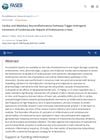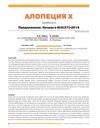 402 citations,
August 2011 in “Cancer research”
402 citations,
August 2011 in “Cancer research” Prostate cancer cells can make their own androgens to activate the androgen receptor, and treatments like abiraterone may increase this ability, suggesting new therapies should target the entire steroid-making pathway.
57 citations,
April 2009 in “The Journal of Steroid Biochemistry and Molecular Biology” Steroidogenesis inhibitors change but don't stop androgen production in prostate cancer.
[object Object] 31 citations,
January 1989 in “The Prostate/The prostate” Estradiol and castration reduced prostate cancer development in rats when applied at early stages, but were ineffective after cancer was established.
 23 citations,
January 1998 in “Urological research”
23 citations,
January 1998 in “Urological research” Castration and finasteride lower urinary oxalate in male rats, potentially treating urolithiasis.
 6 citations,
February 2013 in “Medical Oncology”
6 citations,
February 2013 in “Medical Oncology” Certain genetic variants increase the risk of resistance to hormone therapy in prostate cancer patients.
 4 citations,
January 2013 in “PubMed”
4 citations,
January 2013 in “PubMed” Testosterone and finasteride raise insulin and zinc, lower chromium in male rats.
February 2017 in “The Journal of urology/The journal of urology” Castration significantly reduces prostate size and BPH symptoms.
 8 citations,
February 2021 in “Journal of the American Heart Association”
8 citations,
February 2021 in “Journal of the American Heart Association” Medical castration in prostate cancer patients can increase the risk of serious heart rhythm problems, so it's important to monitor heart activity during treatment.
 April 2020 in “The FASEB Journal”
April 2020 in “The FASEB Journal” Surgical and chemical castration have varied effects on heart and brain inflammation and artery function in sick rats.
February 2024 in “Cancers” New treatments targeting androgen receptors show promise for drug-resistant prostate cancer.
 38 citations,
December 2009 in “Therapeutic Advances in Medical Oncology”
38 citations,
December 2009 in “Therapeutic Advances in Medical Oncology” The conclusion suggests that prostate cancer should be classified by castration status and that new therapies targeting androgen receptor signaling show promise.
18 citations,
September 1972 in “British Journal of Pharmacology” PCPA induces hypersexual behavior in male rats regardless of age or castration status.
 September 2008 in “UK vet. Companion animal”
September 2008 in “UK vet. Companion animal” Castration is preferred for non-breeding male dogs with BPH, but other treatments are available with specific pros and cons.
 108 citations,
September 2002 in “The Journal of clinical investigation/The journal of clinical investigation”
108 citations,
September 2002 in “The Journal of clinical investigation/The journal of clinical investigation” Lowering testosterone speeds up wound healing in male mice.
 58 citations,
January 2003 in “Thrombosis and Haemostasis”
58 citations,
January 2003 in “Thrombosis and Haemostasis” Testosterone may slow down wound healing and increase inflammation.
 30 citations,
July 2019 in “Endocrinology”
30 citations,
July 2019 in “Endocrinology” Certain HSD3B1 gene types are linked to worse prostate cancer outcomes and affect treatment response and other health conditions.
29 citations,
February 1987 in “General and comparative endocrinology” Thyroid and gonadal hormones control seasonal hair growth and molting in male European badgers.
 24 citations,
January 1989 in “Archives of biochemistry and biophysics”
24 citations,
January 1989 in “Archives of biochemistry and biophysics” Male rats have androgen receptors in their liver, which are different from proteins that bind estrogen.
22 citations,
January 2017 in “Journal of steroid biochemistry and molecular biology/The Journal of steroid biochemistry and molecular biology” A new method accurately measures nine specific hormones in human blood.
 21 citations,
February 2021 in “Frontiers in Endocrinology”
21 citations,
February 2021 in “Frontiers in Endocrinology” Hormones affect prostate health and disease, with certain hormone imbalances linked to prostate cancer and benign prostatic hyperplasia.
 17 citations,
January 2015 in “MedChemComm”
17 citations,
January 2015 in “MedChemComm” New treatments for prostate cancer are less toxic and show promise, but more research is needed to enhance their effectiveness and reduce side effects.
 10 citations,
July 2014 in “Veterinary dermatology”
10 citations,
July 2014 in “Veterinary dermatology” Deslorelin may help intact male dogs regrow hair from alopecia X, with a 75% success rate and no side effects.
9 citations,
September 2002 in “The Journal of clinical investigation/The journal of clinical investigation” Blocking testosterone speeds up wound healing in males.
 2 citations,
February 2021 in “Brain Research”
2 citations,
February 2021 in “Brain Research” Testosterone affects blood pressure control and inflammation in male rats with endotoxic shock, and blocking certain hormones may help treat it.
 1 citations,
April 2021 in “Journal of Cardiovascular Pharmacology”
1 citations,
April 2021 in “Journal of Cardiovascular Pharmacology” Testosterone plays a big role in heart and nervous system damage caused by inflammation in male rats, suggesting that blocking testosterone production could help manage this condition.
 April 2020 in “The FASEB Journal”
April 2020 in “The FASEB Journal” Testosterone increases heart and blood pressure issues in rats with endotoxemia, and stopping testosterone production can reduce these problems.
[object Object]  July 2019 in “Acta Scientiae Veterinariae”
July 2019 in “Acta Scientiae Veterinariae” Removing a testicular tumor in a dog reduced its aggressive behavior and skin problems.
 May 2019 in “bioRxiv (Cold Spring Harbor Laboratory)”
May 2019 in “bioRxiv (Cold Spring Harbor Laboratory)” Testosterone significantly affects urination differences between male and female mice.
 January 2015 in “VetPharma”
January 2015 in “VetPharma” Alopecia X causes hair loss in young plush-coated dogs and can be treated with various therapies, but hair may regrow and then fall out again.
 September 2010 in “Companion Animal”
September 2010 in “Companion Animal” The guide explains how to diagnose and treat hair loss in dogs, covering causes and treatments, with some conditions lacking treatment options.





















